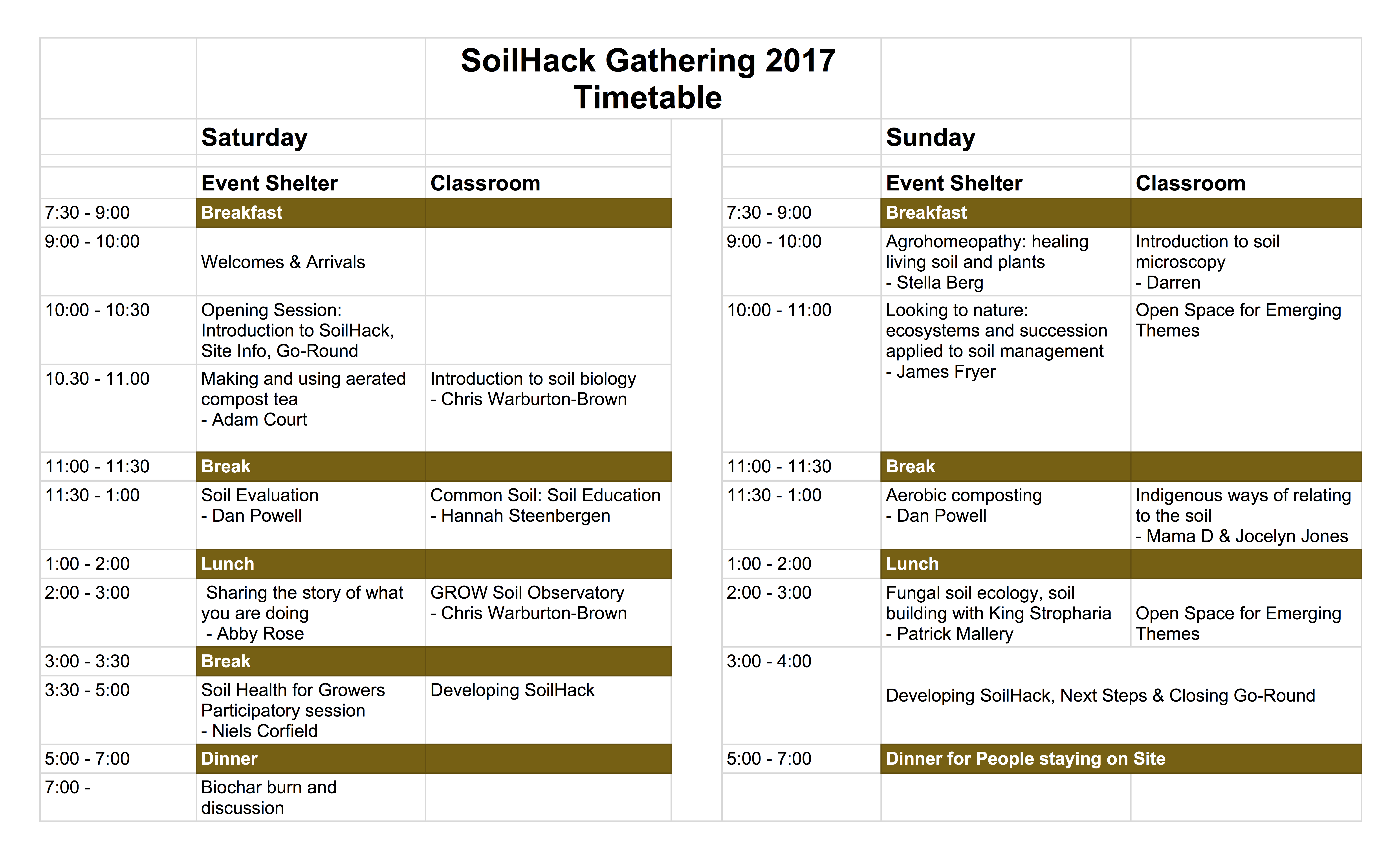SoilHack Gathering 2017 Programme
To download a pdf version of this timetable click here: SoilHack Programme
Please note the programme is subject to change because the gathering is dynamic and adaptive. There are two spaces available for self-organised sessions and emerging themes, and people are welcome and encouraged to self-organise throughout the gathering.
Workshops & Facilitators at the Gathering
Please find a list below of longer workshop descriptions and brief biographies of some of the workshop facilitators. Please note, the gathering aims to breakdown some of the hierarchies between learners and ‘experts’. Many of the facilitators are experienced in their field and have contacted us in advance to offer sessions to share their knowledge, however, the gathering is designed so we can all exchange what we know and learn together in a more horizontal way.
Introduction to Soil Biology
After years of relative neglect, our understanding of soil biology has been revolutionised in the last decade. We now know that soil is alive, and has the most complex ecosystem on earth. One handful of soil from an old growth forest can contain as many living creatures as there are humans on the planet, and over twenty six miles of fungal threads. The biggest living things on Earth are soil fungi, and without earthworms, human civilisation would not exist. And we’re just at the beginning of this voyage of discovery… This short talk will introduce soil biology and explain why it is vital to your garden and to all our futures.
Chris Warburton-Brown is the Research Coordinator of the Permaculture Association.
GROW soil observatory
The GROW Observatory is a European Union project engaging thousands of growers and scientists passionate about the land. We will discover together, using simple tools to better manage soil and grow food, while contributing to vital scientific environmental monitoring. We have big ambitions; we hope to increase small-scale food production and preserve soil quality for future generations, whilst improving forecasting of extreme climate events. GROW will combine data contributed by individuals, groups and publicly available scientific data to generate new open knowledge and practices. Get inspired by GROW, and find out how you can be involved.
Chris Warburton-Brown is the Research Coordinator of the Permaculture Association.
Soil Health for Growers Participatory Session
Exploring the principles of soil health and how they can be used to bring benefits in cropping systems. Students encouraged to bring their crop rotation plans to work on.
Niels Corfield is a soil health and tree specialist working to tackle climate change and flooding through proper management of soil resources.
Agrohomeopathy: healing living soil and plants
Homeopathy is largely about restoring balance to sick organisms, and soils and plants respond beautifully to our remedies. Stella has been working with restoring a healthy biome to damaged soils and also using remedies to strengthen plants so they are resistant to bugs, viruses, mild drought etc. Using some simple techniques you can see for yourself how to help your land settle into an interactive and healthy ecosystem.
Stella Berg has been a homeopathic teacher, writer, and practitioner for almost forty years, and has been exploring using homeopathy on her own crops for over two decades.
Introduction to Soil Microscopy
Introduction to soil microscopy – a demonstration of using a microscope to look at soil micro-organisms, discussion of microscope design and preparing samples.
Looking to nature: ecosystems and succession applied to soil management
The workshop starts from the question “what would nature do?” and explores what a balanced ecosystem looks like, and how this understanding effects our current approach in terms of fighting natural processes instead of working with them. It will highlight methods used on different farms and what makes effective management.
James Fryer is a food grower, writer and advocate for a better food system. They have recently returned from travelling in North America learning from different farms. They believe healthy food starts with healthy soil and are keen to support innovation and learning to achieve this.
Indigenous Ways of Relating to the Soil
This Workshop will do two things simultaneously: it will explore what it is to be indigenous to a place through the filter of what we can learn from other Indigenous communities’ ways of relating to the Earth. Secondly, it will provide a connected experience (a reconnection, a pre-connection) through journeying through the living substrate of the Earth. Your experiences will be a necessary shift in the current dominant paradigm – beyond treating the soil well and not abusing it – to conceiving a relationship in which we are part of the whole and natural world. We will understand ourselves as children of the soil, neither separate nor distinct. We act within rather than act upon the soil. During the session each person will have an opportunity to connect with the Earth through the Soil, participating in a Soul Soil Journey, exploring that which most resonates with their inner self.
Mama D from Community Centred Knowledge, is a curator of the Food Journey and community facilitator and researcher around food justice, environmental justice and general sound, shared livity. Mama D has spent over ten years living and working amongst African communities and other related institutions within Africa, is now working to promoting the indigenous in a world bereft of its benefits.
Jocelyn Jones from World Family Food Sovereignty is a Homeopath and Trauma Therapist. They have a history of living and working in Africa working with organisations of small scale farmers and was training with Sobonfu Some from Burkina Faso in Dagara ritual.
More workshop descriptions coming soon…
